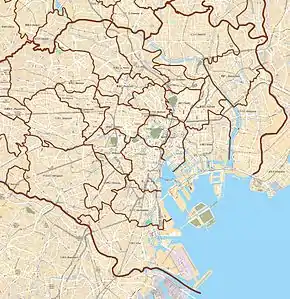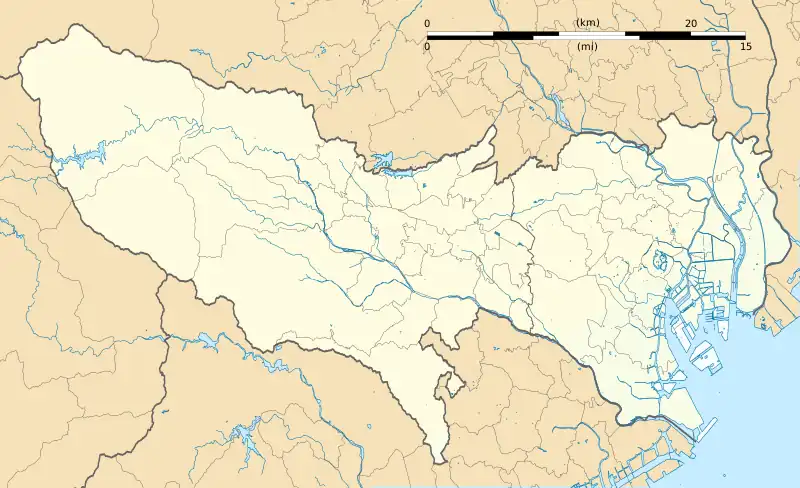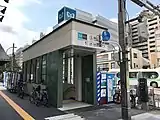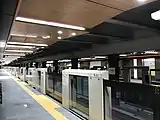G17 Inarichō Station 稲荷町駅 | |||||||||||
|---|---|---|---|---|---|---|---|---|---|---|---|
 Tokyo Metro Inarichō Station station Exit3 (August 11th, 2018) | |||||||||||
| Japanese name | |||||||||||
| Shinjitai | 稲荷町駅 | ||||||||||
| Kyūjitai | 稻荷甼驛 | ||||||||||
| Hiragana | いなりちょうえき | ||||||||||
| General information | |||||||||||
| Location | 3-33-11 Higashi-Ueno, Taitō-ku, Tokyo 110-0015 Japan | ||||||||||
| Operated by | |||||||||||
| Line(s) | G Ginza Line | ||||||||||
| Platforms | 2 side platforms | ||||||||||
| Tracks | 2 | ||||||||||
| Construction | |||||||||||
| Structure type | Underground | ||||||||||
| Other information | |||||||||||
| Station code | G-17 | ||||||||||
| History | |||||||||||
| Opened | 30 December 1927 | ||||||||||
| Passengers | |||||||||||
| FY2013 | 14,831 daily | ||||||||||
| Services | |||||||||||
| |||||||||||
| Location | |||||||||||
 Inarichō Station Location within Special wards of Tokyo  Inarichō Station Inarichō Station (Tokyo Bay and Bōsō Peninsula)  Inarichō Station Inarichō Station (Tokyo)  Inarichō Station Inarichō Station (Japan) | |||||||||||
Inarichō Station (稲荷町駅, Inarichō-eki) is a subway station on the Tokyo Metro Ginza Line in Taitō, Tokyo, Japan, operated by the Tokyo subway operator Tokyo Metro. It is numbered "G-17".
Lines
Inarichō Station is served by the Tokyo Metro Ginza Line from Shibuya to Asakusa.
Station layout
The station has two side platforms located on the first basement (B1F) level, serving two tracks.
Platforms
| 1 | G Ginza Line | for Ueno, Ginza, and Shibuya |
| 2 | G Ginza Line | for Asakusa |
There is no connection between the two platforms, and platform 1 (for Shibuya-bound trains) is accessed from the streel-level entrances 1 and 2 on the south side of Asakusa Dori, while platform 2 (for Asakusa-bound trains) is accessed from entrance 3 on the north side.
 Tokyo Metro Inarichō Station station Exit2 (August 11, 2018)
Tokyo Metro Inarichō Station station Exit2 (August 11, 2018) platform (January 4, 2018)
platform (January 4, 2018)
History
Inarichō Station is part of the first section of underground railway line in Asia, opened on 30 December 1927.[1]
The station facilities were inherited by Tokyo Metro after the privatization of the Teito Rapid Transit Authority (TRTA) in 2004.[2]
Passenger statistics
In fiscal 2013, the station was the least used on the Ginza Line and the 127th busiest on the Tokyo Metro network with an average of 14,831 passengers daily.[3]
The passenger statistics for previous years are as shown below.
| Fiscal year | Daily average |
|---|---|
| 2011 | 13,904[1][4] |
| 2012 | 14,328[5] |
| 2013 | 14,831[3] |
See also
References
- 1 2 Terada, Hirokazu (19 January 2013). データブック日本の私鉄 [Databook: Japan's Private Railways]. Japan: Neko Publishing. p. 214. ISBN 978-4-7770-1336-4.
- ↑ "「営団地下鉄」から「東京メトロ」へ" [From "Teito Rapid Transit Authority" to "Tokyo Metro"]. Tokyo Metro Online. 2006-07-08. Archived from the original on 16 May 2012. Retrieved 29 May 2022.
- 1 2 各駅の乗降人員ランキング [Station usage ranking] (in Japanese). Tokyo Metro. Retrieved 2 September 2014.
- ↑ 駅別乗降人員順位表(2011年度1日平均) [Station passenger figures (Fiscal 2011)] (in Japanese). Japan: Tokyo Metro. Retrieved 2 September 2014.
- ↑ 各駅の乗降人員ランキング (2012年) [Station usage ranking (2012)] (in Japanese). Tokyo Metro. Retrieved 2 September 2014.
External links
- Tokyo Metro Inarichō Station information (in Japanese)